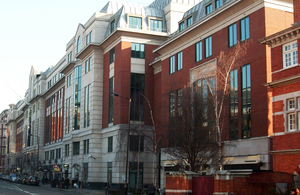A1 north of Newcastle to be route of strategic national importance
Sixty-five miles of the A1 north of Newcastle join a list of key national roads.

Proposals to identify the A1 north of Newcastle to the scottish border a route of strategic national importance were published today (16 September 2010) by Transport Minister, Mike Penning.
The move would see approximately sixty-five miles of the A1 join a list of key roads that ministers consider for funding from the national budget for road improvements.
The proposal is part of the government’s move to ensure the economic importance of routes from England to the capital cities of Scotland, Northern Ireland and Wales are properly recognised.
A number of roads linking Bootle with Twelve Quays Ferry Terminal in Birkenhead, Merseyside, would also become a route of strategic national importance under the proposals. This is because it is the main passenger and freight ferry terminal for traffic travelling between Liverpool and Belfast.
Transport Minister, Mike Penning, said:
Edinburgh, Belfast and Cardiff make a significant contribution to the UK economy and it is vital that the routes connecting them to their nearest strategic destinations in England are recognised. The current system does not do this and it is time to rectify it.
While my proposals will promote connectivity between all capital cities of the UK, it is of particular significance for the A1. Campaigners have long fought to have the A1 north of Newcastle recognised as being of national, rather than regional, importance and I agree.
This change will not guarantee funding for major improvements, however, it will finally recognise the road’s importance for freight and other strategic traffic travelling between Newcastle and Edinburgh.
Last year fourteen Strategic National Corridors (SNCs) were identified by the Department for Transport - recognising the economic importance of road and rail routes linking the largest English cities with the busiest ports and airports in England.
However the current criteria do not specify that key road and rail routes providing links between Newcastle and Edinburgh, Liverpool and Belfast or Bristol and Cardiff should be included.
In practice Cardiff is linked to Bristol via the M4 and M48, which are already recognised as routes of strategic national importance. But Edinburgh and Belfast are currently unconnected to SNCs by road.
Notes to editors
A written ministerial statement announcing the consultation was published today.
The consultation will close on Friday 10 December.
The consultation identifies 2 additional routes of national strategic significance:
- the A1 north of Newcastle - between its junction with the A19 at Seaton Burn - to the Scottish border (providing a defined link to Edinburgh)
- approximately nine miles of local authority controlled roads between Bootle and Twelve Quays Ferry Terminal in Birkenhead, including part of the A565 and the Kingsway Tunnel (providing connectivity with Belfast)
The full route is as follows:
- A565 from junction with A5036 in Bootle to A5063 “Leeds Street”
- then A5063 “Leeds Street” from junction with A565 to A59 “Scotland Road”
- then A59 “Scotland Road” to “Kingsway Tunnel”
- then “Kingsway Tunnel” to grade separated junction with A5027
- then A5027 to junction with A5139
- then A5139 to A554
- then A554 to Twelve Quays Terminal entrance
The A1 north of Newcastle is currently a Highways Agency (HA) regional road. If the proposal is agreed, it will become a HA national road. Prioritisation of funding for the future development of the road would be with the Secretary of State, rather than local stakeholders.
The route identified in Merseyside will not be added to the trunk road network. Responsibility for day-to-day operational decisions, maintenance and improvement will remain with the relevant local Highway Authorities. The Secretary of State for Transport will, however, maintain a watching interest in the route and its effectiveness in providing strategic connectivity.
Press enquiries: 020 7944 3118
Out of hours: 020 7944 4292
Public enquiries: 0300 330 3000